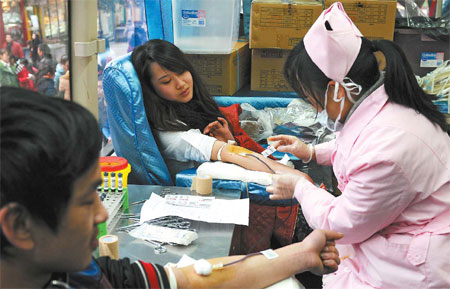Patients may be their own best blood donors
Updated: 2011-12-27 08:17
By Yang Wanli and He Na in Beijing, and Tang Yue in Tianjin (China Daily)
|
|||||||||
|
Restaurant workers in downtown Chongqing make donations aboard a bus that provides mobile blood collection service. Shortages have long been a problem in China, where less than 1 percent of the population donates blood. [Zhong Guilin / for China Daily] |
It isn't new
The first documented use of autotransfusion was in the 1920s in England. Now in Japan and some other developed countries, most blood for clinical use comes from the patients themselves.
Beijing SciTech reported that 80 to 90 percent of non-emergency surgery in European countries is done with autotransfusion - but only 1 percent in Beijing, which has the best medical resources in China.
The country's Blood Donation Law, which took effect in 1998, has clear rules for autotransfusion. Article 15 encourages patients who are planning non-emergency surgery to provide their own blood in advance, so that sufficient other, donated blood will be available for use in emergencies.
Precious resource
Blood shortage has long been a problem in China. The Beijing Red Cross Blood Center issued an emergency call for donors in October. The response pushed the amount of blood at the center to 8,000 units, but that is still far below its standard of 12,000 units.
"The inadequacy of voluntary donation, the rising demand in clinical use and disproportionate demand in different regions have all contributed to the problem," said Ministry of Health spokesman Deng Haihua.
The number of voluntary, unpaid donors in China rose from 6.75 million in 2006 to 11.8 million last year, and the volume of blood increased from 2,995 to 3,935 tons. But it can't keep up with demand. Deng said the blood supply rose about 7 percent last year and the number of surgeries increased 18 percent.
China is among 70 countries worldwide with a blood donation rate of less than 1 percent of the population, a rate the World Health Organization considers to be the minimum necessary. The average in high-income countries is about 4 percent.
"Everyone who works in the blood center in China knows how precious every single drop of blood is," said Yang Wenling, director of Tianjin Blood Center.
"I used to love rain and snow very much but now they worry me a lot," she said. "Every morning when I draw back the curtain, I'm afraid to see a rainy or snowy day, because it leads to fewer people on the street donating their blood in the mobile blood collection bus."
To solve the shortage problem, some companies and government departments organize blood drives among their staffs. Instead of being unpaid volunteers, these donors get an allowance and an extra holiday.
Yang doesn't like the idea. "It used to be a very important source of the blood in our center and it still is in many cities. But it is not good for the long-term development of blood donation."
Real volunteer, unpaid donors may feel it's unfair, Yang said. And compensating donors hints that donating blood is harmful, which is why you need something in return.
"So on one hand, we hope there are more blood donors," she said. "On the other hand, there is still a lot of space for autotransfusion to develop in China."
'Why not?'
"We strongly encourage more patients to use autotransfusion," said Bai Lianjun, director of the blood center at Peking Union Medical College Hospital.
Some diseases can't be detected during the "window period" - the time between the onset of an infection and the appearance of detectable antibodies to virus - but using your own blood eliminates that risk.
"It is safe and can also save donor blood for urgent cases. Especially for pregnant women and those waiting for bone surgery, autotransfusion can be easily practiced," Bai said.
Patients who are waiting for surgeries at his hospital are routinely told about autotransfusion. Wei Yinyun, 28, was given the option before she had a liver tumor removed in late September.
"They explained how it works and the advantages. I think it's great!" she said.
Although she finished the surgery without requiring any blood, Wei said she would tell her friends about the procedure. "More people should know about it, benefiting both yourself and others. Why not?"












